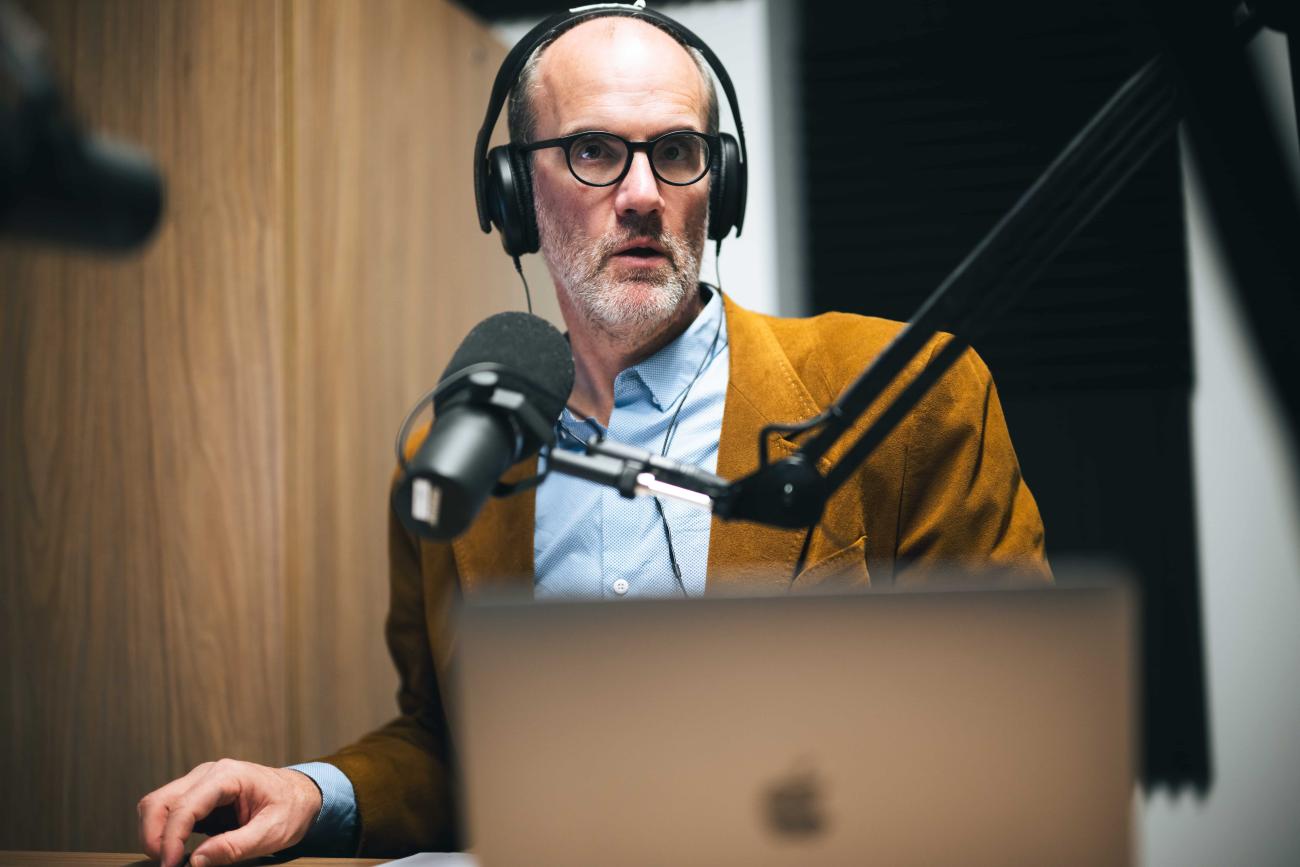Beyond Pride and Prejudice: A Professor's Podcast Makes the Case for Jane Austen—and the Humanities
As the world marks the 250th anniversary of Austen's birth, Michael Kramp shows why her accessible, versatile stories offer more than just happily-ever-afters
Lehigh English Professor Michael Kramp remembers the first time he read one of Jane Austen’s novels. It was Pride and Prejudice -- required reading in a college English class.
“Ever since I first read Jane Austen at age 18, I have been pretty much enamored of her narratives, her characters, and her ideas,” Kramp says. It’s a statement he makes introducing each episode of his podcast, “Jane Austen and the Future of the Humanities.” The podcast can be found on Spotify, Apple Podcasts and other platforms. The podcast is one part of a larger public-facing project that includes a YouTube channel where videos of his ongoing interviews with artists, scholars, and writers from around the world can be viewed. Kramp is also writing a monograph about Austen’s work and its relationship to the humanities.
The podcast coincides with the 250th anniversary of the novelist’s birth in 2025. Austen, Kramp notes, was the first woman to earn a place in the canon of English literature and her popularity endures. “Each time I teach Austen… I ask my students to think about this with me,” says Kramp, who specializes in 19th-Century British Literature. “I ask them, ‘Who else, like Austen, has enduring wide-standing popular culture appeal and is also clearly respected within academic circles? It’s a pretty short list: Shakespeare, right?’
But unlike Shakespeare, he says, Austen is popular with readers both in and outside of academia because she is more accessible to readers, particularly in terms of her language. “You don’t need a decoder lens to understand her,” he says.
Kramp first studied the author with Claudia L. Johnson, now Murray Professor of English at Princeton University. Appearing as a guest on his podcast, Johnson affirmed Austen’s popularity, saying, “You can buy copies of her books in grocery stores. There are mass marketed as well as scholarly editions available everywhere.”
Beyond the Page: A Global Phenomenon
Austen’s stories also have been adapted dozens of times for the screen – additional proof of their popularity. The Jane Austen Society of North America devotes an entire page of its website to “Austen on Screen,” noting that her novels have been adapted or reinterpreted on film and for television dozens of times since 1938. A recent entry in those films – the 2024 film “Jane Austen Wrecked My Life – is spotlighted in a special episode of Kramp’s podcast.
Kramp says three things set Austen apart. “I talk about her versatility, her accessibility, and her ostensible safety, which are the three defining features that make Austen a distinct cultural figure,” he explains. “I think what separates Austen is that she's able to bring all three together. She's very versatile. She's used in all kinds of ways -- politically, creatively, academically -- for different kinds of cultural groups on both sides of the political extreme. She’s widely accessible, and what I mean by that is that you don't need excessive footnotes to read Jane Austen…. Her accessibility is tied to that sort of third prong of my argument, which is that she's perceived to be safe. She's not deemed to be threatening.”
Austen’s subject matter contributes to the sense of safety in her work. She wrote about a seemingly secluded, placid, simple life of people out in the country. “Austen puts these foibles, complexities, and complications and challenges on the table and then she seems to resolve them with marriage. So, when we read Jane Austen, there’s a sense in which things are wrapped up, things are resolved,” he says.
The same attributes have earned Austen’s novels international popularity—a phenomenon that Kramp explores in the second episode of his podcast. The nature of her stories and the accessibility of her language have made her beloved around the world, including in India and other South Asian countries. In Pakistan, the novels are used to help teach English language, he says. In the United States and abroad, authors re-tell her stories, framing them in new cultures and setting them in different time periods.
Life Lessons: Why the Humanities Matter
For Kramp, the podcast is more than an homage to Austen. He is using his episode-by-episode examination of her work to make a case for the value of studying the humanities. Leveraging Austen’s appeal provides a way to have that conversation with public audiences.
“Austen has a distinct cultural status that very few people have because she’s popular, respected, global, accessible, versatile and safe, so she provides a vehicle to talk about the humanities,” Kramp says. “Austen is beloved, so she gives you a great entryway into living rooms to talk to people about the humanities.” The overriding goal of the podcast, he says, is for listeners “to realize that what happens in a humanities classroom is work that stays with you throughout your life.”
“I want people to understand that the humanities…are integral to our lives. And when we give ourselves a chance to listen to someone like Jane Austen, who demonstrates what these humanities experiences are, we realize why the work of these disciplines is vital.”

In each podcast, he considers ideas and experiences that readers encounter in Austen’s novels. In Episode Three, he discusses how Northanger Abbey and its heroine, Catherine Morland, illustrates the role of ignorance in acquiring knowledge. In the novel, Catherine makes many mistakes due to her inexperience – a necessary process for her to gain knowledge. It’s a process with real-life application. Kramp says, “The ability to balance knowledge and ignorance, for example, is something that is crucial for meeting new people or embracing new ideas.”
Such parallels can be found in all the novels. Sense and Sensibility, the focus of the podcast’s fourth episode, offers opportunities for understanding that human relationships are often messy. “If you can appreciate that human relationships are messy, you can manage a lot of situations in the professional workplace and [other situations],” Kramp asserts.
In upcoming podcasts, which will continue into 2026, Kramp outlines insights that can be gained in each novel. Pride and Prejudice offers models for civil discourse in a changing society. In Mansfield Park, we learn that resiliency is not always positive, while in the novel Emma, readers learn about the challenges of living in a community. Persuasion shows us there is no set script for achieving happiness.
The podcast is not the first time Kramp has leveraged digital resources in his work. An experienced filmmaker, he plans to use more digital resources, such as YouTube, to engage the public.
“I want people to understand that the humanities…are integral to our lives. And when we give ourselves a chance to listen to someone like Jane Austen, who demonstrates what these humanities experiences are, we realize why the work of these disciplines is vital,” Kramp says.

